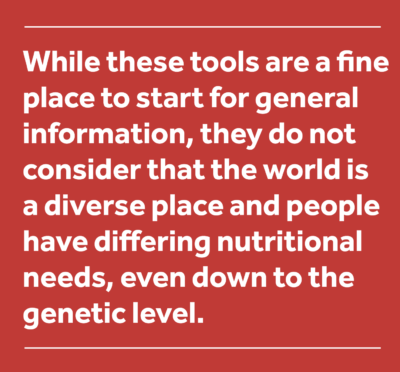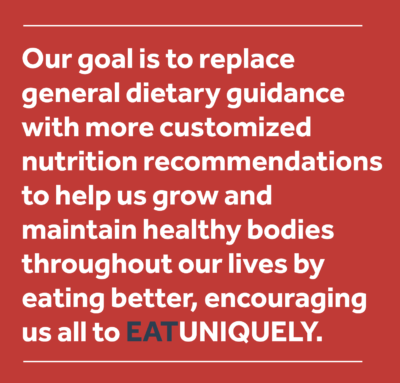In 2008, the UNC Nutrition Research Institute opened its doors with just two faculty members and nine staff. Established as an institute in the Nutrition department of the Gillings School of Global Public Health at the University of North Carolina at Chapel Hill, the NRI brought Tar Heels to the city of Kannapolis, just north of Charlotte. Fast-forward 16 years and the NRI is a standalone research unit of the University with 21 faculty members who each have research teams of their own and a full administrative staff that keeps the institute running. More than 100 people are employed by the NRI in various capacities to advance nutrition research.
At the NRI, our overarching research goal is not just nutrition but precision nutrition. We believe that what we eat is very important. NRI Director, Steve Hursting says, “Diet is the most significant contributing factor associated with cancer, ahead of smoking, alcohol, and family history.”
 Traditionally in the U.S., nutrition information has been doled out in very generalized forms. Many of us grew up with the USDA’s food pyramid; more recently MyPlate has been developed to provide nutrition guidance. While these tools are a fine place to start for general information, they do not consider that the world is a diverse place and people have differing nutritional needs, even down to the genetic level. “What we eat actually modifies our genes,” says NRI faculty member Isis Trujillo-Gonzalez.
Traditionally in the U.S., nutrition information has been doled out in very generalized forms. Many of us grew up with the USDA’s food pyramid; more recently MyPlate has been developed to provide nutrition guidance. While these tools are a fine place to start for general information, they do not consider that the world is a diverse place and people have differing nutritional needs, even down to the genetic level. “What we eat actually modifies our genes,” says NRI faculty member Isis Trujillo-Gonzalez.
The goal of precision or personalized nutrition is to take large groups of people and divide them into increasingly smaller groups based on genetics, lifestyle, environmental exposures, microbiome, and other factors and to develop more specified diet plans for these smaller groups. NRI’s founding director Steve Zeisel says, “Precision nutrition holds great potential to enhance our ability to prevent, delay the onset of, or mitigate the progression of disease and to improve health outcomes.”
Our purpose at the NRI is to use science to help everyone become healthier through better, more personalized nutrition. NRI faculty member Rachel Goode says “Less judgment and more understanding of the social context and determinants of health are necessary. These complex issues circle around privilege, race, and class. We need to consider how we can create treatments for all people, and at all income levels in our communities.”
 At the NRI we seek a better understanding of how nutrients are metabolized in the body and how this is related to human development and disease. Our goal is to replace general dietary guidance with more customized nutrition recommendations to help us grow and maintain healthy bodies throughout our lives by eating better, encouraging us all to EATUNIQUELY.
At the NRI we seek a better understanding of how nutrients are metabolized in the body and how this is related to human development and disease. Our goal is to replace general dietary guidance with more customized nutrition recommendations to help us grow and maintain healthy bodies throughout our lives by eating better, encouraging us all to EATUNIQUELY.
This essay is based on the 3-Minute Theory presented by Walter Friday at Appetite for Life’s Speed-Dating with the NRI in February 2024.
Walter Friday has been a research technician and specialist at the NRI for 12 years, serving first in the Zeisel Lab and currently in the Trujillo Lab where the focus is on understanding the links between choline metabolism and brain development. Broadly, Friday’s work has centered on the foundations of precision nutrition.

